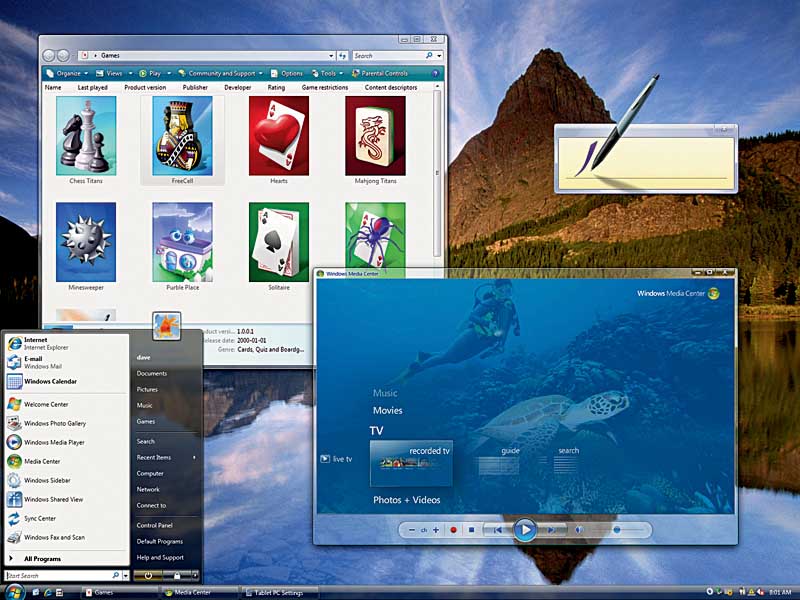BitDepth 561 - January 30
07/01/09 19:23 Filed in: BitDepth - February 2007
Windows Vista is released to the world. What can computer users expect?
Is Vista ready for prime time?

Windows Vista is available in several editions geared to different levels of home and business need. Most home users will be satisfied with the Home Premium edition, pictured here.
Image courtesy Microsoft.
Microsoft launches its flagship product, Windows Vista to the general public today, but it's already been in use by beta testers for months. The product has also officially been in the hands of business users contracted to the Redmond software maker since early December.
With millions of users facing a boxed copy of Vista for the first time, the question should be asked and answered, how well does it work?
The answer to that is a qualified just fine, thank you.
Vista is a completely new operating system, and any experienced computer user will tell you that regardless of the platform, when it's time to make such a big jump, it's best to start afresh.
For users hoping to upgrade their existing systems to the new OS that really means a "nuke and pave," first backing up their document files (including mailboxes, which some folks forget) and downloaded application installers, wiping the drive clean and installing a new copy of Windows.
This isn't an easy task for casual users, so it may become necessary to enlist the aid of a skilled pardner or professional help in making the upgrade.
Any new software you install into the new system may need patches or upgrades to make it Vista-ready, so check for those with the software vendors before reinstalling those applications.
Even computer users getting a brand-new system may be vulnerable to software that doesn't play well with Vista.
At the Computer Electronics Show in Las Vegas earlier this month, an unidentified Microsoft official warned CBC News about software installed by manufacturers on new systems that may not be qualified to run on Vista.
"We call them craplets," the official said. "We can't do anything about it because it would be illegal."
Microsoft's local representatives did not respond to a request for comment on the potential for problems arising from the issue, so Bitdepth turned to the TTCS, who have been testing Vista since the public beta was launched.
On a fresh install of Windows Vista, we tried common non-Microsoft software on a custom-built PC on which all applicable Vista recommended system level updates had been made.
First up, we put a DVD into the box. Windows Media Player 11 popped up with a memory warning on a system with 1GB of memory with no other applications running and refused to play the movie.
Next we tried VideoLan Client, the open source media player that's famed for playing almost any type of video file. It opened the disc, but would only play audio with no video.
Next up at the wicket was Cyberlink PowerDVD 5, which reported an installation error, but completed the install and ran the DVD flawlessly.
GIMP, the open source image editor stalled during its installation of fonts, but pressing the control-alt-delete keys allowed the installation to continue without further issues and the software worked on launch.
Wing Commander Saga, an opensource game built on the Freespace engine could not get an acceptable response from the default Open GL drivers that shipped with Vista.
A quick visit to Nvidia's website offered updated Vista drivers for the video card, and the game ran flawlessly after they were installed.
These woes, handled with some aplomb by the tech savvy folks at the TTCS, were live examples of the kinds of problems that users may face when they try to use existing software under Vista.
It should be noted, though, that these were issues that may also have been unique to this particular configuration of hotrodded parts.
But it wasn't all problems. Java 6 installed and worked, as did Firefox 2, Adobe's Acrobat 8 and AVG's Free Edition of their anti-virus software, which was recognised by the new Windows Security module built into Vista.
Microsoft has already released an update for Internet Explorer 7, the company's default browser that improves performance. There are still some lingering issues with IE7's background scripting and HP's software for its printers.
Other products still awaiting key Vista updates include business-focused software like Lotus Notes and Intuit's Quickbooks.
The lesson in this exercise for potential Vista purchasers is an old one. Prevent rather than cure. Run Microsoft's Upgrade Advisor software <http://www.microsoft.com/windowsvista/getready/upgradeadvisor/default.mspx> to get a handle on how much work you'll need to invest in getting an older system ready for Vista and upgrade essential software first, testing as you go to ensure that you have a system than takes advantage of everything that this Windows upgrade has to offer.

Windows Vista is available in several editions geared to different levels of home and business need. Most home users will be satisfied with the Home Premium edition, pictured here.
Image courtesy Microsoft.
Microsoft launches its flagship product, Windows Vista to the general public today, but it's already been in use by beta testers for months. The product has also officially been in the hands of business users contracted to the Redmond software maker since early December.
With millions of users facing a boxed copy of Vista for the first time, the question should be asked and answered, how well does it work?
The answer to that is a qualified just fine, thank you.
Vista is a completely new operating system, and any experienced computer user will tell you that regardless of the platform, when it's time to make such a big jump, it's best to start afresh.
For users hoping to upgrade their existing systems to the new OS that really means a "nuke and pave," first backing up their document files (including mailboxes, which some folks forget) and downloaded application installers, wiping the drive clean and installing a new copy of Windows.
This isn't an easy task for casual users, so it may become necessary to enlist the aid of a skilled pardner or professional help in making the upgrade.
Any new software you install into the new system may need patches or upgrades to make it Vista-ready, so check for those with the software vendors before reinstalling those applications.
Even computer users getting a brand-new system may be vulnerable to software that doesn't play well with Vista.
At the Computer Electronics Show in Las Vegas earlier this month, an unidentified Microsoft official warned CBC News about software installed by manufacturers on new systems that may not be qualified to run on Vista.
"We call them craplets," the official said. "We can't do anything about it because it would be illegal."
Microsoft's local representatives did not respond to a request for comment on the potential for problems arising from the issue, so Bitdepth turned to the TTCS, who have been testing Vista since the public beta was launched.
On a fresh install of Windows Vista, we tried common non-Microsoft software on a custom-built PC on which all applicable Vista recommended system level updates had been made.
First up, we put a DVD into the box. Windows Media Player 11 popped up with a memory warning on a system with 1GB of memory with no other applications running and refused to play the movie.
Next we tried VideoLan Client, the open source media player that's famed for playing almost any type of video file. It opened the disc, but would only play audio with no video.
Next up at the wicket was Cyberlink PowerDVD 5, which reported an installation error, but completed the install and ran the DVD flawlessly.
GIMP, the open source image editor stalled during its installation of fonts, but pressing the control-alt-delete keys allowed the installation to continue without further issues and the software worked on launch.
Wing Commander Saga, an opensource game built on the Freespace engine could not get an acceptable response from the default Open GL drivers that shipped with Vista.
A quick visit to Nvidia's website offered updated Vista drivers for the video card, and the game ran flawlessly after they were installed.
These woes, handled with some aplomb by the tech savvy folks at the TTCS, were live examples of the kinds of problems that users may face when they try to use existing software under Vista.
It should be noted, though, that these were issues that may also have been unique to this particular configuration of hotrodded parts.
But it wasn't all problems. Java 6 installed and worked, as did Firefox 2, Adobe's Acrobat 8 and AVG's Free Edition of their anti-virus software, which was recognised by the new Windows Security module built into Vista.
Microsoft has already released an update for Internet Explorer 7, the company's default browser that improves performance. There are still some lingering issues with IE7's background scripting and HP's software for its printers.
Other products still awaiting key Vista updates include business-focused software like Lotus Notes and Intuit's Quickbooks.
The lesson in this exercise for potential Vista purchasers is an old one. Prevent rather than cure. Run Microsoft's Upgrade Advisor software <http://www.microsoft.com/windowsvista/getready/upgradeadvisor/default.mspx> to get a handle on how much work you'll need to invest in getting an older system ready for Vista and upgrade essential software first, testing as you go to ensure that you have a system than takes advantage of everything that this Windows upgrade has to offer.
blog comments powered by Disqus

